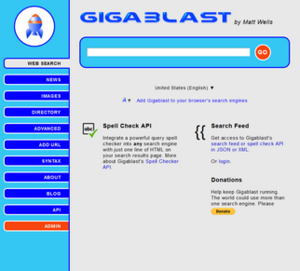Gigablast
Free and open-source web search engine From Wikipedia, the free encyclopedia
Gigablast was an American free and open-source web search engine and directory. Founded in 2000, it was an independent engine and web crawler,[6] developed and maintained by Matt Wells, a former Infoseek employee and New Mexico Tech graduate.[7] During early April 2023, the website went offline without warning and without any official statement.
 Home page as of January 2019 | |
Type of site | Search engine |
|---|---|
| Available in | English |
| Founded | 2000 |
| Dissolved | April 2023 |
| Headquarters | Albuquerque, New Mexico, United States[1] |
| Owner | Gigablast, Inc. |
| Created by | Matt Wells |
| Registration | Optional |
| Launched | 2002[2][3] |
| Current status | Offline |
| Written in | C/C++ |
| Developer(s) | Matt Wells |
|---|---|
| Final release | |
| Repository | https://github.com/gigablast/open-source-search-engine |
| Written in | C/C++ |
| Operating system | Linux |
| Type | search engine |
| License | Apache License 2.0 |
| Website | www |
The open-source search engine source code is written in the programming languages C and C++. It was released as open-source software under the Apache License version 2, in July 2013.[8] In 2015, Gigablast claimed to have indexed over 12 billion web pages.[9]
The Gigablast engine provided search results to other companies at various times, including Ixquick,[10] Clusty,[11] Zuula, Snap,[12] Blingo, and Internet Archive.[13]
Background
Matt Wells worked for the Infoseek search engine until he left in 1999, to start working on what would become Gigablast, coding everything from scratch in C++. It was originally designed to index up to 200 billion web pages.[14] Gigablast went into beta release on July 21, 2002.[15]
Features
Gigablast supported various specialized searches and Boolean algebra operators.[16] It also supported a related-concept feature called Giga Bits[17] and a blog-search feature.[18]
A feature called Gigabits provided relevant information in addition to what the user was searching for.[19]
Gigablast also claimed to be, as of 2010, the "leading" clean energy search engine with 90 percent of its power coming from wind energy.[20]
Acquisition
In 2013, it was reported that Yippy had agreed to acquire Gigablast Inc.[21] However, later on, Gigablast author Matt Wells said that no acquisition took place and that Gigablast remained independent.[13]
Critical reception
In 2003, The New York Times columnist Lee Dembart stated that "Gigablast has its adherents", but opined that Google is "head and shoulders" above it, and adds that Google's search results are more complete.[22] In 2016, a Lifewire reviewer felt that Gigablast is easy to use and liked the Gigabits feature.[23]
See also
References
External links
Wikiwand - on
Seamless Wikipedia browsing. On steroids.
